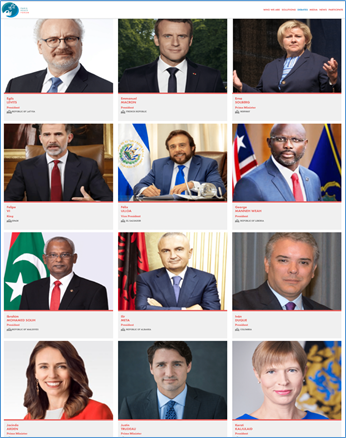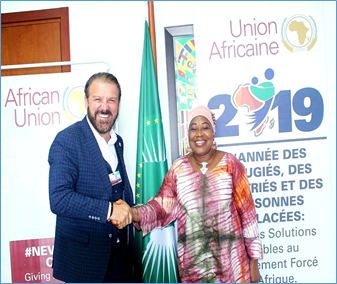An overview from Fabio Bargiacchi, Founder of the European Centre for Electoral Support, one of the ten organisations awarded at the 2020 Paris Peace Forum.
As the unprecedented COVID-19 crisis threw the international community into turmoil and uncertainty, the McLuhanian concept of a “global village” has seldom been as relevant.

France, through the organisation of its annual Paris Peace Forum (PPF), a platform dedicated to advancing governance solutions and multilateral cooperation, has reasserted its dedication to promoting joint, multilateral efforts in the pursuit of global peace and good governance.
Initiated in 2018 by French President Emmanuel Macron, the PPF aims to “contribute to bridging the governance gap” and promote collective responses to global issues.
The “Paris Call”, which was signed by 51 countries, 130 companies and 90 universities and non-governmental groups during the first edition, has since been likened to a digital version of the Geneva Convention and praised as a “turning point for world democracy”.
Reporters Without Borders dubbed this non-binding declaration as “one of the most significant initiative in defense of the freedom, independence, pluralism and reliability of news and information since the adoption of the Universal Declaration of Human Rights in 1948”.

In light of these upheavals, Fabio Bargiacchi reflects on the importance of the French initiative and its role in promoting democratic governance worldwide, including through its support to electoral processes amidst COVID-19.
COVID-19 and how the PPF can help
“The stability of any country can only be achieved if societies are built on an inclusive, sustainable and credible electoral process, which is perceived as fair and where conflicts and mitigated and managed. This requires a much greater international cooperation, to develop common solutions to existing and rising challenges while learning the lessons of many flawed electoral processes where Europe can certainly play a decisive part.”
"As we saw with the COVID-19 crisis, no country is safe from the impact of global threats, whether social, medical, economic or political. Yet, despite the devastating impact this pandemic has had on health systems, economies, and lesser known long- and short-term consequences for elections, democracy and countries’ security, it has also offered an opportunity to put our collective knowledge to the service of others. And it has forced us all to adapt and develop new methods and spaces for collaboration.”
“For organisations like ECES, which works on fostering electoral democracies around the world, such events are a golden opportunity to learn and share experiences in order to develop new forms of collective action to contribute to advancing global governance.
The 2020 PPF edition came at a particularly crucial time as we saw the entire international community sent into a free-fall in the aftermath of the COVID-19 outbreak.
Seeing the number of political leaders, leading representatives from some of the most important international and not for profit foundations, the media, academia and research, philanthropy, private companies, trade unions and religious organisations, who participated in the event really proves the interest in the issue of global governance and democratic development.”
“For ECES, having such a platform to exchange with such high-level participants was a windfall. Those three days spent brainstorming, sharing and learning from one another allowed us to develop new forms of collective action to advance worldwide governance solutions. This type of synergy is extremely important in our field of work.”

Paris Peace Forum and its support for action
“The strength of the PPF is its focus on sustainability: no project is featured only for the show. So, far from being a one-off annual event showcasing projects that promote global governance and positive change, the PPF has a much wider purpose which is to empower, strengthen and support projects like ours in their implementation and development.
We witnessed that first-hand after being selected in the innovative Scale-Up Programme (SCUP) which is a pro-active mentorship system that bolsters innovative projects and organisations like ECES. The SCUP puts emphasis on the long-term impact and contribution we can make to the countries where we work and provide innovative solutions to advance their peace and governance agendas.
Through this programme, we have been benefiting from the precious advice and collaboration of two high level senior advisers and former senior staff of the EU and the UN, Stefano Manservisi and Jean Marie Guéhenno. This is paving the way for us to present the update of our own approach -the European Response to Electoral Cycle Approach- during the 2021 Paris Peace Forum edition.”
“Sustainability, capacity development stemming from comparative experiences and the prevention of electoral conflicts have always been the watchword at ECES, as our non-partisan, independent and not for profit foundation intrinsically embodies this commitment towards sustainable, incremental change. We have intervened in the electoral processes of over 50 countries worldwide over the past 11 years, and we highly value the ties we have created with partners, donors and electoral stakeholders around the world.Our selection in the PPF is yet another additional step towards building a more interconnected, collaborative community that supports and promotes values such as equality, preventing electoral conflicts, women political engagement and democratic development.”
ECES contribution to PPF Objectives
“I left my former job as senior staff of the EU and the United National Development Programme to established ECES at the end 2010 along with the late Abbot Apollinaire Mulhongo Malu Malu (former President of the Electoral Commission Forums of the countries of the Southern African Development Community and of the Central African States).
My reason behind starting ECES was very tied to my deep attachment to my European and Italian roots: back in 1997 when I was working in the democratic assistance field – notably during an OSCE mission in Bosnia-. It dawned upon me that there was no specialised not for profit foundation dedicated to delivering electoral assistance with EU funding like IFES for instance, which had been receiving funding from USAID since 1992.”
“For me, it was therefore essential to find a way to promote the European values of ownership, cost-effectiveness and visibility of the electoral cooperation between the EU, its Member States and their partner countries. I believed in the need to bring the great passion, commitment and shared comparative knowledge of my European colleagues, to support electoral processes worldwide and promote these values. To me, it was truly ‘my calling’ and I continue to feel a profound fulfilment while contributing to the work that the international community is doing in terms of democratisation via partnerships with the EU and its Member States, peer exchanges and south-south collaboration.
Again, that is exactly in line with what the Paris Peace Forum seeks to promote: international cooperation at the service of democracy, peace and world stability. This is why France’s support to the global governance through the PPF is so reflective of our ideals and initial purpose.”
“Over the last 11 years, ECES has strived to support the partner countries of the EU and of its Member States to organise their electoral processes in a credible and transparent manner as the best contribution to prevent electoral conflicts and to promote stability toward inclusiveness and fair societies. Our selection in the PPF is yet another additional step towards building a more interconnected, collaborative community that supports and promotes values such as equality, preventing electoral conflicts, women political engagement and democratic development.”
ECES’ action towards global governance via supporting electoral processes in the challenging COVID-19 times
“When the coronavirus pandemic hit, we realised we needed to find a way to continue delivering electoral assistance activities to our partners, and to do so in a contextualized manner to ensure the maximum possible benefit within their different contexts.
We have therefore developed the Innov-Elections concept project in a record time, in order to provide an alternative distance coaching and learning method on electoral matters to continue to provide capacity development to all electoral stakeholders, especially in Africa. We then received the funding of the Italian government to implement this project, together with the Sant’Anna School of Advance Studies and the United Nations Institute for Training and Research. Innov-Elections is part of the new Italian strategy of cooperation with Africa outlined in their new policy document “Partnership with Africa" launched on 15 December 2020 by Italian Foreign Minister Luigi Di Maio.
To us, the Innov-Elections project is the example of the need for sustainable, adaptive and collaborative solutions to new problems that are promoted at the Paris Peace Forum. We already delivered an important number of distance coaching sessions aimed at sharing ECES expertise on all aspects of an electoral cycle and facilitating the exchange of comparative experiences and good practices among the participants. These are representing the majority of the electoral management bodies in Africa also via the Regional Organisations in Africa dealing with electoral assistance and election observation like the African Union, the Southern African Development Community, the Economic Community of Western Africa States and the Economic Community of Central African States and East Africa Community, among others.”
“In conclusion it is important to underline that the most crucial activities ECES has and will continue to implement are aimed at supporting electoral processes while effectively handling the very complex and delicate set of interactions among all electoral stakeholders. This means working not only with electoral management bodies but also donors, political parties, CSOs, media actors, institutions dealing with electoral dispute resolutions and governments institutions dealing with the securisation of the elections”.
“At the end of the day, the focus of our activities always has and always will be to be on the early warning efforts and the prevention and mitigation of conflicts in electoral processes. Confidence and capacity-building dialogue initiatives (regional, national and community level) can contribute to strengthening and consolidating a wide range of electoral stakeholders’ commitments and adherence to common and shared democratic values.
In addition, support to religious networks and associations working with inter- and intra-faith dialogue has the potential to deal effectively with political and electoral challenges and contribute to the progress of democratisation and peaceful conduct of elections in ways that will give meaning and direction to followers of different faiths, anchored in religious guidance.”
About the PPF:
The Paris Peace Forum was initiated in March 2018 by French President Emmanuel Macron, with the aim of “contributing to bridging the governance gap”. The Forum was launched to commemorate Armistice Day, as well as to “reflect together, propose concrete initiatives, reinvent multilateralism and all forms of contemporary cooperation”. President Macron and then-president Justin Vaïsse aimed at bringing together global governance actors, in an international and open space, in order to interact, discuss and generate concrete solutions. An important aspect of the Forum is the showcasing of 100+ projects from around the world. Each of these projects proposes an innovative solution to a specific issue in the following six major themes, namely Peace & Security, Development, Environment, New technologies, Inclusive economy and Culture & Education.
Visit: https://parispeaceforum.org/
About ECES:
ECES is an independent, non-partisan and not for profit Foundation headquartered in Brussels with a global remit. ECES was established at the end of 2010 and has implemented activities already in more than 50 countries, mainly, but not only, in Africa and the Middle East, primarily with funding from the EU and EU Member states. ECES has obtained the TRACE certification for its financial management transparency and the ISO 9001 certification for its Quality Management System. ECES has crafted and copyrighted its strategy called "A European Response to Electoral Cycle Support - EURECS", which is implemented via specific methodologies and tools also copyrighted by ECES.
Visit: www.eces.eu






